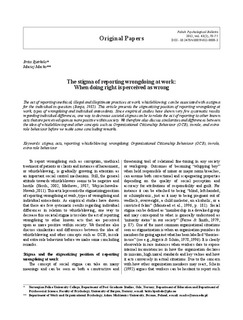The stigma of reporting wrongdoing at work : when doing right is perceived as wrong
| dc.contributor.author | Bjørkelo, Brita | |
| dc.contributor.author | Macko, Maciej | |
| dc.date.accessioned | 2012-09-13T07:28:18Z | |
| dc.date.available | 2012-09-13T07:28:18Z | |
| dc.date.issued | 2012 | |
| dc.identifier.issn | 1641-7844 | |
| dc.identifier.uri | http://hdl.handle.net/11250/174672 | |
| dc.description.abstract | The act of reporting unethical, illegal and illegitimate practices at work, whistleblowing, can be associated with a stigma for the individual in question (Banja, 1985). This article presents the stigmatizing position of reporting wrongdoing at work, types of wrongdoing and individual antecedents. Since empirical studies have shown very few systematic results regarding individual differences, one way to decrease societal stigma can be to relate the act of reporting to other known acts that are perceived upon as more positive within society. We therefore also discuss similarities and differences between the idea of whistleblowing and other concepts such as Organizational Citizenship Behaviour (OCB), in-role, and extrarole behaviour before we make some concluding remarks. | no_NO |
| dc.language.iso | eng | no_NO |
| dc.subject | whistleblowing | no_NO |
| dc.subject | stigmatizing | no_NO |
| dc.subject | wrongdoing | no_NO |
| dc.subject | varsling | no_NO |
| dc.subject | stigmatisering | no_NO |
| dc.subject | forseelse | no_NO |
| dc.title | The stigma of reporting wrongdoing at work : when doing right is perceived as wrong | no_NO |
| dc.type | Journal article | no_NO |
| dc.type | Peer reviewed | |
| dc.source.pagenumber | 70-75 | no_NO |
| dc.source.volume | 43 | no_NO |
| dc.source.journal | Polish Psychological Bulletin | no_NO |
| dc.source.issue | 2 | no_NO |
